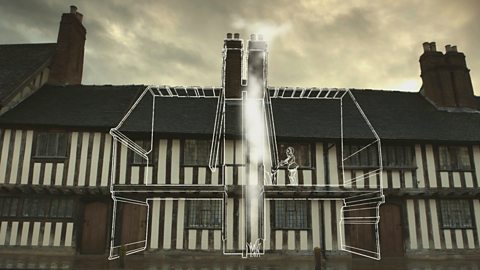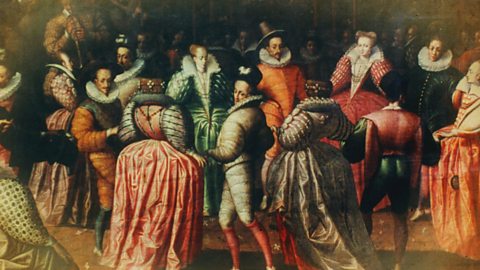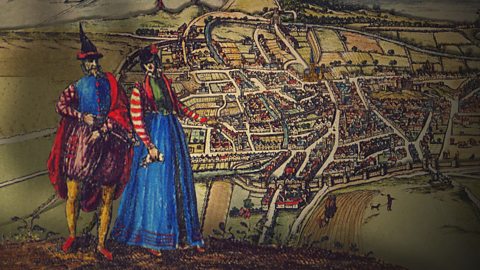Ian Mortimer:
Take almost any painting from Elizabethan England and what do you see? Royal courtiers dressed in silk and velvet magnificent jewels and ostentatious ruffs extravagant feasts and joyous dancing.
These artworks always depict the lives of the very rich. Why? Only they can afford such luxuries as paintings. But while these people may have more money than anyone else, they don't have all the power. There is another important group of people known as the gentry.
Not all the gentry are super rich, but they are by no means poor and they are certainly powerful. They don't just control the people around them - the villagers and their own servants. They practically own and run the whole country.
From the ranks of the gentry, magistrates and sheriffs were drawnand almost every official in central and local government. In Parliament, too, it's the gentry who fill the House of Commons. As a wealthy traveller, you might stay at an inn, but only if you really have to.
You'll feel much more at home if you arrange to stay at the house of a gentleman. Look around and you'll see the signs of the owner's wealth and status - the carved wood, perhaps a portrait or two, maybe even a mirror. You'll also find carpets, but they're laid across the tops of tables and over chests. Only the exceptionally wealthy ever put them on the floor.
Another clear sign that you're in the house of a gentleman is the presence of servants. From just one or two in a modest household to 20 or more in a wealthier one. Every manservant will cost you about £2 per year and every female domestic helper about half that. As a guest of the house, you deserve pleasant sleeping quarters which brings us to the bedchamber.
The first thing you must do on waking up in the house of a gentleman is to attendto your personal hygiene. Cleanliness is an important part of culture and sophistication and the rich will expect you to do something about any bodily odours you might have.
The obvious answer is to have a bath, but the Elizabethans do not share our obsession with soap and water. In fact, they believe thatunclean water can make you unwell by entering the pores of your skin. In that, they're not far wrong. Rainwater collected from the roof is pure since it comes directly from God, but this is a luxury reserved for washing the parts of the body that show.
Since anything else such as river water may indeed carry infection and disease, you should follow the example of your fellow Elizabethans and avoid bathing in it. Linen towels called rubbers are used to rub your skin and even your hair clean. Shirts, smocks and other undergarments which soak up sweat and catch dirt are changed daily. As you can see, you keep yourself clean by washing not your body, but your clothes.
The rich also make use of perfumes and pomades to improve the smell of their clothes, bodies and hair. And while getting rid of yourbodily odours, you mustn't forget to take care of your breath. In the absence of dental floss, you might use a toothpick made of wood, bone or the quill of a feather.
There are no toothbrushes, so instead, you'll clean your teeth with a tooth cloth which is a strip of linen. As for freshening your breath, you might chew cumin seeds or aniseed. Either of these is probably going to be more advisable than doing what some physicians recommend which is washing your mouth out with white wine, followed by spirit of vitriol. Spirit of vitriol is sulphuric acid.
Just in case you don't know, sulphuric acid is dangerously corrosive. You may be surprised to learn that the Elizabethans travela great deal, irrespective of their wealth. But poor people rarely go more than a few miles and when they do travel, it is almost always on foot.
As a member of the gentry, you wouldn't dream of travelling in such a dangerous, dirty and vulgar way. What you want is a set of wheels. Coaches have soared in popularity as a result of the Protestant revolution. Gentlemen and their families coming back from the continent have brought with them the customs of places like Antwerp where there are 500 coaches on the streets of the city. The greater number of coaches in England means the price drops, allowing even the lower reaches of the gentry to travel in this way. In the 1570s, for instance, you can pick up a second-hand coach for around £8 and a team of four horses for an additional £10.
For the budget traveller, you can even hire one for 16 shillings per day, plus food for the coachman. But don't forget to allow for horse feed which can easily cost more than the meals for yourself and your servants. During your long journey, you may wish to rest at an inn or tavern for a much needed meal and a drink. But be very careful what you say to strangers and make sure your servantsdo the same.
While your servants may believe they're just having a casual chat with their newly made acquaintances, perhaps mentioning your name, their words may find their way back to the Queen's secretary, courtesy of his spy network. There are spies everywhere, even in your own household, listening to your every word and reporting back to the Queen's chief adviser, Sir William Cecil.
But why go to such lengths? Why the suspicion? It's because the Queen has no shortage of enemies. There are Puritans who disagree with Elizabeth over their religious beliefs. There are also many Catholics in England and abroad, including the Pope and Philip II of Spain, who do not like the idea of a Protestant Queen on the throne. This puts Elizabeth I in danger. In the 1580s, there is an attempt on the Queen's life almost every year. One of these schemes in particular shows the lengths to which plotters will go and the effectiveness of this Elizabethan secret service.
In 1586, a group of conspirators, led by a young Catholic gentleman called Anthony Babington, hatch a plot to kill the Queen. Their plan is to assassinate her and, with the help of a Spanish invasion, to put Mary Queen of Scots on the throne instead.
Babington smuggles coded letters in and out of Mary's prison using waterproof wallets in ale barrels. Walsingham's spies intercept these letters and break the code, but they don't raise the alarm immediately. Instead, they put the letters back in the barrels, so Babington and his friends don't realise the game is up. It's a brilliant move. Not only do the conspirators incriminate themselves further, they also unwittingly deliver proof to Walsingham that Mary herself is complicit. Eventually, no fewer than 14 of the conspirators are caught. They are sentenced to death and so is the Scottish queen.
Assassination plots and treason are mainly of concern to the cream of society. The poor are far too busy simply trying to surviveand such treachery is dealt with by the very highest authority. Star Chamber is a special court, so called because it meets in the Star Chamber in the Palace of Westminster. The mere mention of its name is enough to strike fear into the heart and you had better pray you are never summoned to appear before it.
There is no jury in the Star Chamber and rumour alone can be enough to find you guilty of treason. Worse still, you can be punishedby just about any method seen fit - imprisonment in the Tower, whipping or branding, cutting off your ears or hands or slitting your nose. Public executions are a means of demonstrating government power and social control, as well as removing some enemies of the state.
For the masses, they're also hugely popular as forms of entertainment. The most common method of execution is hanging, the standard punishment for everything from theft to witchcraft. As a nobleman, you might be able to avoid this by begging the Queen to allow you to have your head cut off instead. But these methods of execution are positively humane compared to the one reserved for traitors.
The unbelievably grisly sight of someone being hanged, drawn and quartered is arguably the most infamous and graphic demonstration of the appetite for cruelty. This is the fate that awaits the Babington conspirators.These executions serve as a stark reminder that at a moment's notice, even the most privileged may lose their riches, their power and their lives. These are dangerous days, uncertain times, and it's worth remembering that those who have the most also have the most to lose.
Video summary
Ian Mortimer discovers an emerging new class of people who were becoming very wealthy in their own right.
They were known as the landed gentry and held positions of increasing influence, such as magistrates, sheriffs and MPs.
On his travels he explores the everyday lives of the gentry, including their homes, hygiene and travel.
While they were comfortably well off, they also had a lot to lose.
Elizabeth I demanded absolute loyalty from her subjects and had an extensive spy network designed at uncovering her enemies.
Once discovered, she showed no mercy as her cousin Mary Queen of Scots and the Babington plotters discovered to their cost.
This short film is from the BBC series, Time Traveller's Guide to Elizabethan England.
Teacher Notes
Pupils could use this resource as a starting point for their own research into the life of the gentry in Elizabethan England.
They could use additional sources to consider the controversy about the extent of Mary’s involvement in plots to assassinate Elizabeth I, and whether she should have been executed.
This short film is suitable for teaching history at Key Stage 3 in England, Wales and Northern Ireland and at Level 3 in Scotland.
To what extent was life changing in Elizabethan England? video
Ian Mortimer takes a journey back in time to find out how life was changing in Elizabethan England.

What was life like in the court of Elizabeth I? video
Historian Ian Mortimer takes a journey back in time to find out what life was really like in the court of Elizabeth I.

What was life like for the rural poor in Elizabethan England? video
Ian Mortimer takes a journey back in time to find out what life was really like for the rural poor in Elizabethan England.

What was life like for the poor in the towns of Elizabethan England? video
Historian Dr Ian Mortimer takes a journey back in time to find out what life was really like for the poor in the towns and cities of Elizabethan England.

Why was London the centre of the Elizabethan world? video
Historian Ian Mortimer takes a journey back in time to find out why London was the centre of the Elizabethan world.
